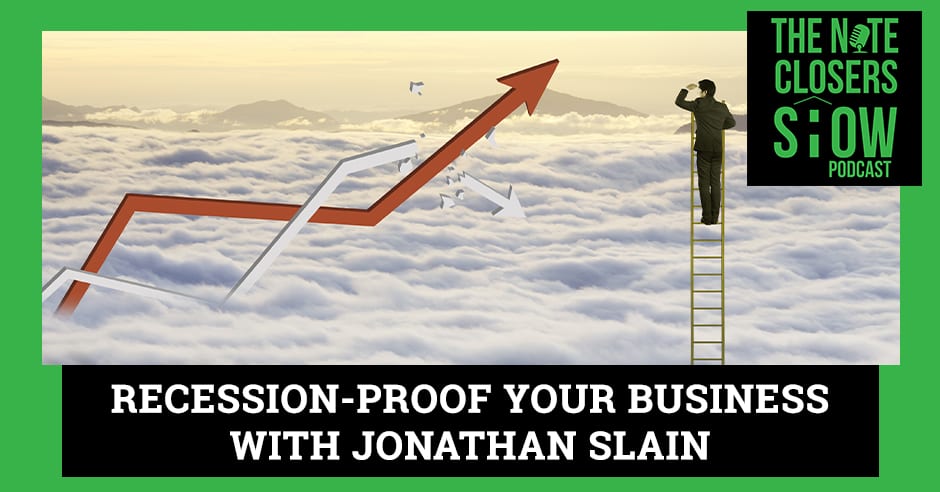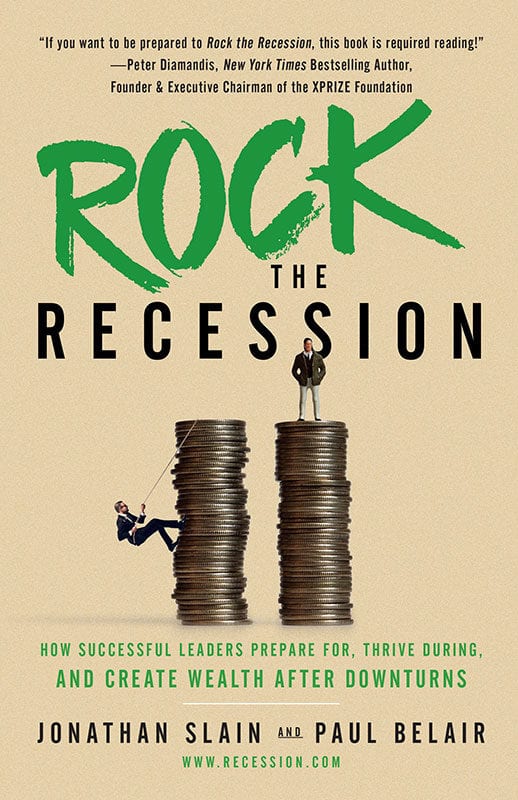
The last recession devastated the American economy in more ways than one, so if another one comes along, you’ll need to make sure your business is able to make it out alive despite the obstacles. Surviving the recession is all about keeping yourself on your toes, and making sure you’re prepared for any given eventuality, and fortunately, there are plenty of ways you can make this happen for you. Jonathan Slain is an acclaimed recession expert and author of the bestselling book, Rock the Recession: How Successful Leaders Prepare For, Thrive During, and Create Wealth After Downturns. Ensuring your business is recession-proof is a long, detailed process. It’s about time you got in on the secret to ensured long-lasting prosperity with Jonathan and Scott Carson.
—
Listen to the podcast here
Recession-Proof Your Business With Jonathan Slain
I’m even rocking with somebody who is a Cleveland native. He’s our special guest here. You’re going to love what he shares. The title of this episode is Rock the Recession, for the most part. I’m excited to have Jonathan Slain join us. Jonathan’s book Rock the Recession: How Successful Leaders Prepare For, Thrive During and Create Wealth After Downturns is a number one Amazon bestseller. Jonathan coaches high-growth leadership teams across the United States to implement the operating system also known as Traction. If you’ve read the book, it’s an amazing book, and every entrepreneur should read that. He focused on working with entrepreneurial niche specialty firms and large corporations. He spends about a third of his year traveling, working with teams like yours. We are honored to have him here. How’s it going, Jonathan?
I’m good and ready to rock. Thanks for having me on.
We’re honored to have you here. We’re looking forward. When you reached out to me and talked about your Rock the Recession, I was like, “This is perfect.” We’ve got to spend some time on this. I bet you’re heavily sought-after in podcasts and doing interviews with everything going on in the industry.
A lot of what I talk about is good basic business hygiene. I decided to wrap it in a marketing wrap related to the next recession, but a lot of this stuff is the stuff that business owners and investors should be doing in any case. The original part is that how to prepare for a recession is a topic that’s been written about a lot. Typically, you cut overhead. You try to survive and that’s how you prepare for a recession. My business partner and I were more interested in how do you look forward to a recession? That’s what’s awesome for your readers since they’re real estate investors, note investors. Recessions can bring us massive opportunities. What do we need to do now since we know we still have a little bit of runway to our inner recession to prepare to take advantage?
That brings the first question, are we not in a recession? I’ve heard people say we aren’t. I’ve heard people say that we are, that we’ve been into it for a few months. What’s your opinion or your outlook on that?
I don’t think that we’re in a recession right now. Since the economy grew in the fourth quarter, it will be at a slower rate that potentially we could be headed towards some downturn. Most importantly for me, it’s going to be at least six months from now until we’re officially, technically in a recession because the government announces the GDP numbers a quarter in arrears. I don’t want to bore the readers with that, but for me, agnostic of what’s going on in the economy, it still makes sense to prepare for a recession. It’s like, what if your biggest deal goes sideways or what if you find out that your business partner embezzled money from you or your business partner decides to go across the street and start their own investment company without you?
All of those scenarios that I brought up would put you in a recession as an individual investor, business owner, agnostic of what’s going on in the economy. I don’t want to dodge your question. I do think a lot of what we’re hearing in the news right now related to the United States and Iran, all of those geopolitical machinations that are going on could put us into a recession. Because it’s often a black swan event, like a war or a geopolitical instability that will tip us over into a recession and the issue is we can’t see them coming. The best we can do is to be prepared.
What are some of the best ways that you share with your clients and investors out there? Some of the best ways to prepare for success during a recession is probably what I want to get at versus preparing things that they can put in place?
The first step, what we call first gear is to assess where you’re at. It’s to benchmark how you’re doing as an investor versus everybody else. On Recession.com, which is the website, we’ve got a free twenty-question assessment that we developed by figuring out the things that leaders that made a lot of money and did well in the last couple of recessions. What were they asking themselves before the recession? That’s how we came up with the twenty questions. We’ve gathered over 1,000 responses. For your readers, they should know that our average response right now is 38 out of 100. If you go to Recession.com, you take the free assessment and you score above a 38, then you’re probably more prepared than average and below a 38, you’re less prepared.
If you’re 38 or below, it’s highly likely that in the next recession, your business is going to go out of business or you’re going to go bankrupt as an investor. The questions will guide you to what you can focus on because that’s step two. Step two is now that you’ve benchmarked yourself, now that you know how you’re doing versus everyone else, what are you going to do to start tuning up your business and your personal life? For individual investors, that’s why I’m so excited to be on with you. You have a massive opportunity because there are a lot of things you can do as an individual investor to tune yourself up before you see on CNN and Fox that we’re in a recession.
What are some of those things that you’ve seen from some of your respondents out there that are scoring above a 38?
One of them is to make sure that you have an appropriate amount of capital available and that capital may be cash or debt. Either way, do you have enough money to be able to weather a downturn? It may be that you’ve got a war chest so that in a downturn you can buy properties or you can buy notes. We know in a recession obviously that there’s going to be that many more opportunities to buy distressed notes. You want to have cash available. If you don’t have cash available, do you have a line of credit available? That line of credit could be a business line. It could be a personal line. It could be a signature loan line or it could be a home equity line of credit. I’m not sure what vehicles do you usually see with your readers.
All of them. Retirement accounts, self-directed IRA, having cash from cashflow from payments or rights coming in. We work with Merrill Chandler from Get Fundable or CreditSense talking about how do you improve your personal and business credit profile so that you’re able to get those lines of credit or credit cards that have low-interest rates and being able to leverage that loan industry to go out and buy high yield investments.

Rock the Recession: How Successful Leaders Prepare for, Thrive During, and Create Wealth After Downturns
One of the things that I love about this tune-up gear is that right now is the perfect time to have a conversation with your bank about extending your line of credit. What about going back to the bank and asking them if they’ll reduce cap or get rid of personal guarantees that you might have? I know that sounds crazy and nobody is thinking about it right now because the economy is booming, you can have those conversations with your banker. If you try to ask them to increase your line when we’re in a downturn or if you try to ask them to get rid of your personal guarantee when we’re in a recession, they’re going to laugh at you. Banks are hungry for our business so we can do those things.
That’s a great thing to say there, especially as an ex-banker. The first of the year, banks make the most amount of money. They incentivize their bankers the most for lines of credit or loans. They pay him for checking accounts or other stuff, but they make the most out of their loan department. The banks are in the business of making loans and doing notes. It’s a new quarter, a new year for your goals. Commissions and things like that, people and bankers are hungry to do that because that’s an easy conversation. They’re motivated right now more than anything else to make that happen. I’m glad you brought that up, Jonathan.
Scott, I have to admit I’m also a recovering investment banker so I get where you’re coming from. For me, you make a great point about how bankers are incentivized. I want the readers to think through that nobody’s thinking about this right now because most of us are flush. We’re doing well. It’s been over a decade since the last recession. I’m guessing a lot of your readers weren’t even investing maybe over a decade ago. They haven’t been through a recession. They don’t understand the full depth of the opportunities that they can bring or the pain that they can bring in. That’s where you want to spend time in that second gear getting yourself and your business tuned up.
I got into the note business because I had left my mortgage business back in 2008 when everything hit the fan. That’s why we like taking the opportunity of buying distressed debt at a big discount and working to help the borrowers that have gone through their own personal recessions, to get them back on track and be a re-performing note and having that cashflow roll in. The fact that we’re buying assets cheaper than most of the regular investors out there, they’re buying at $0.85, $0.90 of value. We’re picking things up well below that. That gives us that extra people capability if we’ve got to adjust payments or modify the streams or reduce rental rates to make sure we’re still cashflowing and sitting flush when things do take a downturn.
It’s all great points. Once your readers assess where they’re at and once they tune themselves up, the third thing we’re recommending is to raise. That’s where you’re going to spend time doing things like implementing traction in your business. You had mentioned the Entrepreneurial Operating System, which is a fancy way of talking about a system for your business so that you can have a common vision, core values for the business. You can figure out how to hire the right people. I know that a lot of the readers is probably interested in starting to build a team. Right now, with unemployment at record lows, it’s pretty much the toughest time in the last 60 years in our country to hire great people, to hire A-players.
Traction talks about what that can look like and how to systemize that process as well as how to hold great weekly meetings, how to solve issues, what scorecard to put together for your business, and what the right cadence is for getting together with your team and refreshing all of that stuff that I talked about. Now is the best time to do that because you have the luxury of being able to tweak things. It’s very hard to tweak and improve when the world is blowing up around you and for your investors. For the readers, they’re all going to have such massive opportunities. They’re not going to want to focus on the nuts and bolts of the business. They’re going to want to focus on growing and going when we hit this next downturn.
For the last several years, we’ve talked about our niche in the note business only being 3 to 5 years before it was going to change. It stuck around longer than that. We look at a downturn, especially a number like a mortgage default rates at lows, 2.5% out there across the board low. There are a lot of new faces in the crowd, a lot of new originations, new homes being bought and sold or refinances. It means there are still a lot of new mortgages out there that 2.5% default rate means a big number still for us, but it’s a different animal. Those people that have done well, those of us who have done well is because they’ve done exactly as you said. They’ve built a team. They’ve put systems in place. They’ve implemented EOS and read Traction. Go back to it on a regular basis. It’s not something that you want to set at once and forget about it. Jonathan, it has something you’ve got to be working on constantly, tweaking and fine-tuning.
With Traction, there’s a bunch of other systems for running your business that predates Traction. I don’t know if the readers have heard of the Gazelles program, the Rockefeller habits, scaling up, scalable. Traction is the most recent of all those that I rattled off, but it is derivative of all those programs. The one thing I love about it is that it has a regular cadence for getting together and refreshing things. That’s quarterly. That’s what I love because, in a lot of cases, we do our planning for our businesses once a year. We do it on an annual basis. With so many messages with social media competing for every moment of your attention and our phones being ubiquitous, getting together quarterly is necessary to keep that strategic planning top of mind. Maybe many years ago, before cell phones inhabited every minute of our lives, it wasn’t necessary. Now if you’re not going back to something like that once a week, once a month, once a quarter, I don’t think it exists anymore.
People think and plan out their year starting in October, November, January 1st and they don’t spend a lot more time on it. They’ll spend more time on their vacation than they will on their business planning or even their retirement accounts or their war chest we talk about. That’s the big thing that I like to tell people. Every dollar you make, set aside something. Set aside 10% tithes to yourself if you need to start putting that money aside and then tithe to God or pay your bills with every other 90% out there. We see that habit a lot of times people hand them out. Everybody’s got to keep up with the Jones’. Very few people are scaling back their buying habits, “I can go and get a discount. This money is going to be around forever.” That is not the case.
Those people that have that mindset, when the banks do reduce their lines of credit or reduced credit card limits or a deal goes south that you’re not expecting that if you don’t have that extra on the side, you can be hurting. You can be in a personal recession when everybody else was doing well. We’ve experienced that in the past with ups and downs in our business. Anybody can have that happen to them. Even though I’m like, “It’s never going to happen to me,” it can happen. Even those with a job are getting laid off, those things can happen to put you in a recession.
You hit on something that’s personal for me that I want to talk about. I’ve got what I’m calling this Slain Family Quest Board. That’s where my wife and I every year plan out what we want to do for the year and figure out what our financial goals, what our business goals are, what the goals are with the kids. The reason I’m reacting to you bringing up this idea that so many people don’t tithe for themselves, don’t have a plan for what they want to do. That’s so critical for the readers. It’s a big part of recession planning, not only for business but recession planning for your personal life as well. We can all lose our jobs. We could lose a primary stream of income or a secondary stream and do have a plan for that. You’re not trying to change the tire while you’re going 70 miles an hour down the highway. I appreciate the sentiment that you brought up.
For my wife and I, it’s figuring out for us a year in advance. Like you were saying, most people are spending more time preparing for the holidays and planning the holidays than they do their personal life. For us, a lot of this recession planning bleeds over. Do you know what we do personally? We like to plan out the adventures for the year and do that a year in advance because we’ve found when we do that, everybody else conforms their calendars to ours. Few people plan things a year out that if we decide the week that we’re going to Europe and we tell everybody that I work with, all my clients and we tell everyone at her work since she’s a doctor, everybody else takes vacation around ours and works around it. I love what you’re talking about, so I wanted to go there.
I was talking about putting it on the calendar and play around it because honestly, people will not respect your schedule until you start respecting your own schedule first and foremost. I love the planning of the stuff out and what you want to accomplish, not only just business goals or personal goals but also adventure goals and having fun. We work hard. We should play hard too.

Surviving The Recession: All of America’s political and geopolitical machinations might just be the thing that puts the country into another recession.
That exact phrase is part of my life plan and part of the core values of what I want to do. To bring it back to a recession, the way that I look at it is that I’m not a big fan of this idea that everybody has to hustle and grind and that’s the only way to be successful in business. A lot of the business literature, a lot of business books right now, it’s like the only way that you can make a lot of money is if you’ve got your job and you’ve got your side hustle, you do your investing on the side. When you’re not doing your primary job and you’re not doing your side hustle, you drive Uber every waking minute except for sleeping four hours. That’s a success. Rock The Recession is all about how we can use a disruptive opportunity like a downturn to 10x our income if we’re smart about it and we plan ahead. You have to plan ahead because recessions come around once every 7 to 10 years on average. They’re not everyday opportunities. You’ve got to be ready for it.
You’ve got to prepare for the future. I laugh when you said the whole side hustle thing because I’m hearing Gary Vaynerchuk’s words, “You’ve got to sign up. It’s going to work.” You’re right. You work hard for a few hours. You’ve got to live. You’ve got to recharge those batteries. If you’re constantly doing only getting four hours of sleep, you’re likely not going to be working for Uber very long or Lyft because you can probably end up in a wreck.
We both know it’s not about not working hard. I’m not saying you can do the four-hour workweek idea. It’s that the recession thing, the reason I look forward to the next one is that if you’re an investor and you’ve got a war chest set aside, you can buy into massive deals, opportunities, notes that aren’t available in the market right now. I know you have a plan, Scott. I know you’ve got money set aside so that you’re ready to pounce when we hit our recession. You’re ready to buy those notes that aren’t available right now, but that you know from experience will be, as soon as CNN starts blasting everywhere that we’re in a recession, people panic. There are going to be foreclosures. People are going to file bankruptcies. You’re going to be able to jump in with the money that you’ve set aside with the line of credit that you have available.
If the readers don’t act now, they’re going to miss out. They’re going to be sitting on the sidelines trying to figure out why it is that they never seem to get lucky and not understanding that a lot of it is being prepared ahead of time and having a lot of these things done. For me, that fourth gear that I’m trying to get everybody to shift into is being ready to acquire three things in a downturn, in a recession. The first is how do you acquire other businesses that go out of business? Maybe there are other investors that have a portfolio. They didn’t read our blog. They don’t read the We Close Notes blogs because they suck. They don’t get this great info.
They’re not prepared and they go out of business and have a bankruptcy. That’s one thing that you can do. You can buy in a recession. The second thing would be assets. It’s buying notes from other people that can’t afford to support them anymore. That’s something that in the great recession I was very good at. I didn’t buy distressed notes. What I bought was a gym equipment. The reason is that I had relationships that I had pre-set up with banks and they knew that I was a fitness guy. They knew that I had cash. When they would have to repossess a gym’s worth of equipment, the bank would call me and they’d say, “Jonathan, we’ve got a gym. We repossessed it. It’s in New York City. Are you interested?” I’d say, “Yeah.” They’d send me over an Excel spreadsheet with all of the equipment.
I looked it over. It would be like $34,000 worth of equipment. I’d call them back and I’d say, “I have maybe $1,000 or $2,000 that I could send you as a cashier’s check.” The guy would go, “Let me call you back in an hour.” They would call back in an hour and go, “If you overnight a check for $1,000, you can have the equipment.” The reason is that banks do not want to own gym equipment. You have to move it. If they own it, they have to go and get the key to the gym. They rent a truck. They have to hire four strong people to move all this stuff. They have to put it in a storage unit. They have to get it set up for an auction. They have to pay the auction a third of whatever they make.
Banks are not in the business of auctioning off fitness equipment. We were both bankers so we both know the OREO category, the Other Real Estate Owned by banks. They don’t like that. That’s not what they want to be doing. They want to sell loans. They do not want to be owning real estate that they take back from people. There are great deals. The reason I’m belaboring this point though, is that the only way to get access to those deals is to start networking with bankers now, to have relationships so that when we hit the downturn, they’ll call you because you’re top of mind for them. They know that you’re an investor that has a track record that has cash. If you wait until we’re in a downturn and you start trying to call your banker, it’s too late because the bankers already know they can call Scott. Scott’s got money. He’s been talking to him once a month for the past two years. They know you’re a real person. They’re not going to waste time getting to know somebody new from the readers. They’re going to go to the people that they know that they’ve done a deal with already that has cash.
A lot of the deals that we see now, even in the back years and we expect to see more is the fact that we have stayed in contact with the bankers, with an email once a month. They’ve got my email for the last few months. They’ve got something they can move or we’ve branded into their brain the green emails that we send out, our logo. They’re like, “I’ve got something I’m looking to move now. Who do I know? I don’t know anybody. I know Scott. Let me give Scott a phone call. I know Jonathan. Let me give him a phone call.”
Being able to do some deal, even a small deal, it may not be the best deal so that you can start to have a track record so that you could close the deal. Those are tactics that can be implemented by the readers right now so that they can start to get prepared. The last thing you acquire in fourth gear is that once we’re in a recession, you’re going to have access to great talent. It may be that right now you’re like, “I’ve been trying to hire somebody to work with me for a year. I can’t find anybody good.” That’s because A-players don’t advertise for new jobs, for new opportunities on LinkedIn nor on Indeed. That’s not where A-players go to find their next opportunity. They go to their network.
Can you network now with 10 to 28 players so that when we hit a downturn or when we get close to one and they start to get nervous about their job, their opportunity because the owner of that business doesn’t have a plan and they start to think, “Where could I go? I know that guy Scott has been calling me once a quarter and it sounds like his business is growing. It sounds like he’s got a plan with inverse investing for what they’re going to do in the next recession. Maybe I’ll give him a call and see if I can work with him.” That’s how you can acquire a top-level talent in a recession. Again though, it takes prep right now to have that list of 10 to 20 people that you’re talking to. Players don’t cold call you. They don’t find you through websites, newspapers, etc.
When you’re hiring, looking to hire, expand your team, you’ve got to pay for good people. Paying for good people and good talent has always been worth it because they’re going to do more than versus barely getting by. We’ve got students of ours that they’re buying assets. They’re capped out what they can do individually. I keep telling them, “You need to hire an assistant. You need to hire somebody now. Get them trained.” They go, “I can’t afford to.” I’m like, “You can’t afford to. That bandwidth, that bottleneck is you. You’ve got to expand that up and add somebody to it to help you take advantage of opportunities versus trying to nickel and dime yourself at the death.”
Another thing too is that for the readers, maybe some of them are rolling their eyes because they’re like, “A good assistant is going to cost $35,000 to $50,000 a year. There’s no way that I can afford $3,000 or $4,000 a month.” For me, one of the other things that are great right now is that there are so many contract workers on sites like Upwork.com or Fiverr.com. I don’t have any affiliation with those sites, but I do regularly use them because if I need something typed up and transcribed for me, I can find somebody on Upwork that can do that work that loves it for very inexpensively. It might be $15 to $20 per hour. I can buy a few hours if I need a new logo design or if I scribble something down and I want them to make it look pretty for marketing purposes.
There are so many people that can do that and the best part is that since they’re halfway around the world, often I’ll send it to one of the people that I love to work with. By the time I wake up in the morning, they’ve already got a draft back to me. From the readers that may not be ready to make the full-time commitment to paying an admin, there are other ways to start to dip your toe in so that you can spend your time leveraged on the things that you’re best at that add value. I know that your story is part of that. What your best time is when Scott’s on the phone, that you can close deals and make things happen, but you might have to dial 54 times to get one deal done. You don’t have time to be doing a lot of the logistical things. You can have somebody else support you with those details.

Surviving The Recession: Because the economy is booming at the present, it’s easier to talk to bankers about increasing your line for the future.
Look at what your best revenue-generating activities are and do that. That’s one of the big things that we learn from EOS is looking at what am I paid the best at and what’s my hour worth? Anything below that hour, delegate those tasks off to somebody else in our office, my staff, interns, VA’s even to get them to do that so that I’m a lean mean note closing machine.
In the Traction world, we call it to delegate and elevate. If the reader is like, “I don’t even know where to start with that,” you can read the book. The other thing, if you want to read the book, I would start again with assessing where you’re at. That’s always my starting point. Do a time study for a week. Every 30 minutes, write down what you’re doing, 2, 3, 4 words. It might be sending emails. It might be phone calls. It might be a bathroom. I don’t need any more details than that. For a week, every 30 minutes, write down what you’re doing. At the end of the day, some people prefer to go back through their calendar and write down what they were doing for each 30-minute chunk. At the end of the week though, you should have a pretty good picture of where you’re spending your time.
We know from time studies that most people spend 60% of their time on shallow work, on work that doesn’t add any value, that doesn’t move them forward. Maybe at best they spend 40% of their time on deep work. Those are the things that you’re doing that add value that nobody else on earth could do as well as you can do. You want to figure out what are the shallow things you’re doing, what are the deep things that you’re doing, and how can you automate eliminate or delegate all of the shallow work so that you can spend more and more of your time on the deep stuff?
It takes me back to growing up. One of the first ways I learned that was traction, but also going back to the day, working as a pool technician, my boss wanted to know what I was doing every day, every 15 to 20 minutes. I’m not sitting there getting my tan on, drinking virgin piňa coladas. That’s one of the easiest ways to do it, to write it down, see what you’re doing, going back and being honest about what you’re doing in those 15 to 30-minute chunks. Picking the list, what could I or should I have delegated and things that I can do versus others.
There are three buckets for me. You can delegate it. You’ve explained exactly what that is. You could get a VA. You could get your assistant to do it. You could automate it. I know you had automated the process of reminding me about our interview. I got automatic emails. I got automatic text messages from you. The readers can think about is there a way that you can automate some of the things that you’re doing. Can you use apps to help your communication, your follow up, even the logistics for planning your trips and tracking all that stuff or receipts or finances, whatever it might be?
The last one is to eliminate as I’ve yet to see a time study where somebody couldn’t eliminate 10% of what they’re doing and have it had no effect on their net profit. A lot of us, we get complacent. We do things a certain way. We don’t spend the time auditing how we’re spending our time. We’ve got a lot of waste in what we’re doing. What does that 10%, if you stopped doing it, it wouldn’t have any effect, but you’re doing it now because you’ve always done it that way?
It’s like one of the things that we do when we have sales to our educational stuff or workshops, anybody gets signed up for any of that stuff. I take 10% and put that aside immediately. We don’t even see it out there.
If you’ve read the book, Profit First?
Mike is a buddy of mine, the author.
Mike is a buddy of mine.
I met Mike originally at Podfest a few years ago. Chris Krimitsos has introduced us together. I was going to get off and say, “You’ve got to meet Mike if you haven’t had a chance to,” so it’s funny.
For me, in our whole Rock The Recession system is the emergency brake. For the readers that’s still with us, putting up with us, you should have an emergency brake. That’s the traditional recession plan. If we get into a downturn or if you personally hit a downturn and all the stuff that we’re talking about isn’t working, you’re not able to pounce. You’re in a bad way with your line of credit or your war chest and you’re not able to acquire other assets. You need to have an emergency brake, a plan for what you’re going to do. If all of a sudden you saw that your cashflow was slipping and it fell the 90% of what you were projecting, what would you do? What expenses would you cut? If it slipped to 80%, what expenses would you cut? What assets would you sell? 70% and 60%, maybe down to 50%.
The whole idea here is that when we did the research for the book, when we talked to people that successfully grew their businesses and in the great recession, one of their secrets was to have a plan that they planned out in the cool, rational light of day instead of the emotional heat of the night. When we’re in a downturn and it’s because you found out that your partner stole a bunch of money from you and you’re pissed off. You’re mad. You’re disappointed in yourself because you didn’t see it coming. You want to have a plan already written down on paper that you’ve committed to instead of trying to figure it out while you’re curled up in the fetal position in the corner of your office.

Surviving The Recession: Recession planning isn’t only something you do for your business. It has to come into your personal life as well.
That’s the big thing is when we do get emotional, we often make horrible decisions. That’s why you’ve got to take the time. Never send an email when you’re emotional too. If you’re going to write it, write it but don’t send it. You may regret eating those words later on when you’re like, “I wasn’t in the right space.” We’ve all done that at some point before. Out of the people that you interviewed with your book, is there 1 or 2 that stood out with something that they said or a habit that they put in place that you were like, “That makes so much sense?”
The first one that comes in mind is Christie Hefner. She’s CEO of Playboy after Hugh, one of Hugh’s daughters. What Christie told me was that Playboy, when they saw the Great Recession coming, they started to invest more in marketing, spend more money on marketing because they knew that their competitors would spend less money on marketing in the recession. Traditionally, the research shows that companies pull back on marketing in a recession. It’s one of the first things to go is spending on a recession, spending on marketing in a downturn. The ROI for Playboy goes up because for every dollar they spent, they had more eyeballs looking at their marketing, spending more on TV, spending more on radio. For the readers, it’s thinking through what everybody else is pulling back on what they’re spending on marketing. Can you increase it so that you can take advantage of those opportunities?
Especially these days, so much media is available at very inexpensive costs. You need time to put it together with video, YouTube, Facebook and LinkedIn and all these things to get your word out and what your focus is to reach out to clients and things like that. You’re 100% right. Marketing is usually the first cut for a lot of things. Often, that’s the kiss of death because nobody knows that they’re there anymore for the most part. When you are facing, you want to have that, “We’re still here. We’re still doing things.” That’s one of the biggest things that helped us in the recession is when so many note buyers went out of business several years ago and we were dialing for dollars and reaching out, people were like, “You guys are still around. I’ve got something for you that nobody else saw.”
For the readers, it wouldn’t cost a lot right now to hire an Upwork person to help you put together a marketing campaign that has that tagline of “We’re still here.” You put it on the shelf. As soon as Fox and CNBC are running recession banners, you can start putting those ads out there. You’ve got to have them ready to go now because we all know that developing a marketing campaign takes a minimum of two weeks or a month. To have it on the shelf now, to have it ready to go, it is the hedge that a lot of the readers can do for very little investment that could pay 10x returns.
That is such truth of things out there. It does take some time. I was talking about somebody. We’ve got an upcoming podcast summit that’s online. I’m like, “You’ve got to start definitely promoting. If you want people to show up in a month, you’ve got to start promoting and take a while for people to see it, to interact. 80% of sales are made for the fifth contact. Most people give up after the first one and don’t do anything about it.
That was one of the stories. If you want one more, the guy that I wrote the book with, Paul Belair, his story is that right before the great recession, he invested $1 million with his team to buy a company. They grew it over 63 months during the recession. They sold it for over $70 million. For the readers, that’s $1 million investment for a little over five years and sold it for over $70 million. A lot of how they did that was using the recession as a tailwind because they knew that they bought a company that installed heating and air conditioning systems. They knew that in a recession, people wouldn’t want to install a new system, that they would rather serve their existing system because nobody wants to spend $10,000 on a new heating and air conditioning system when we’re in a downturn.
Everybody will spend $200 to $1,000 to fix what they’ve got, to put chewing gum and duct tape on it just to get through. They saw that trend coming and so they focus on their business, 80% on doing great service. Nobody else was thinking that way at the time because most contractors love that quick hit of $10,000 to put a new system on your roof or in your basement. They were ahead of that curve for all of your investors. I’m thinking through what can you do now to set yourself up so that when the recession hits, it will be a tailwind for you instead of a massive headwind.

Surviving The Recession: During a recession, marketing is usually the first thing that goes out the window.
Jonathan, for our readers, members to learn more about you or to take that assessment again, what’s the best way for them to reach out to you?
All my contact info is on Recession.com. That is our website. The assessment is there and the assessment is free. There are some other tools that people can buy if they like our stuff. My contact info is on there. It’s Jonathan@Recession.com. I can get with you after this and maybe get you a coupon code. If the readers want to go and buy one of the products, that would be great too.
Jonathan, this has been a fun discussion. We’ve got to definitely have you back on at a later time again talking about when things start to go and dive into something. We’ve got to get Mike on the horn at some point too. Thanks so much. Take advantage of what Jonathan has offered up there. Go on, check out the assessment on Recession.com. That’s a $1 million website. Take advantage of it. It’s always great to hear from previous bankers. Understand the same mindset of what we do. Look for opportunities where maybe others aren’t looking or staying ahead of the curve and staying in contact with those. Maybe they’ll have something now, something tomorrow, but at some point, they’re going to have something. They’re going to talk and feed you because you’re the squeaky hands, the squeaky wheel and you stay in touch with them. Go out, take some action and we’ll see you all at the top.
Important Links:
- Rock the Recession: How Successful Leaders Prepare For, Thrive During and Create Wealth After Downturns
- Profit First
- Upwork.com
- Fiverr.com
- Jonathan@Recession.com
- http://Recession.com
About Jonathan Slain
 Jonathan’s book, “Rock the Recession: How Successful Leaders Prepare For, Thrive During, and Create Wealth After Downturns” came out in September 2019 and is a #1 Amazon Best Seller.
Jonathan’s book, “Rock the Recession: How Successful Leaders Prepare For, Thrive During, and Create Wealth After Downturns” came out in September 2019 and is a #1 Amazon Best Seller.
Jonathan coaches high growth leadership teams across the United States to implement the Entrepreneurial Operating System® also known as “Traction.” He focuses on working with entrepreneurial niche/specialty firms and large corporations ($10M+ in annual revenue), spending over 100 days per year working with teams just like yours.
Jonathan was Valedictorian of his graduating class and had the highest GPA ever in the history of Shaker Heights High School, where he was also voted “Next Bill Gates and Least Likely to Lose his Virginity.”
Love the show? Subscribe, rate, review, and share!

